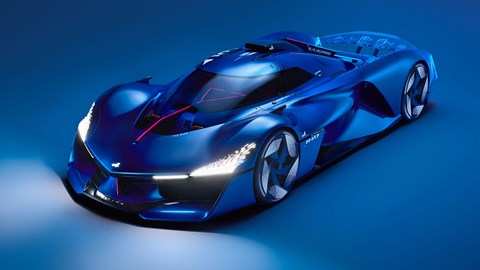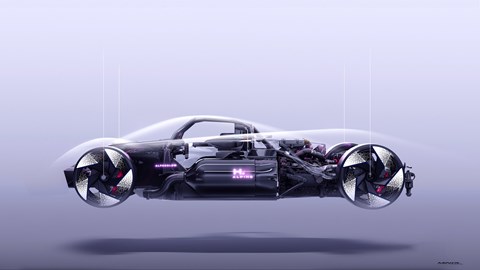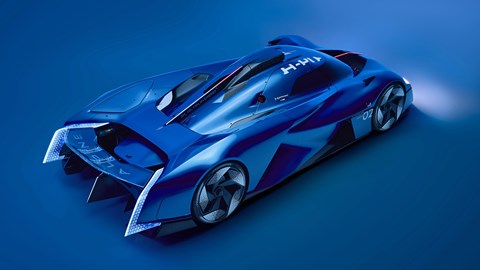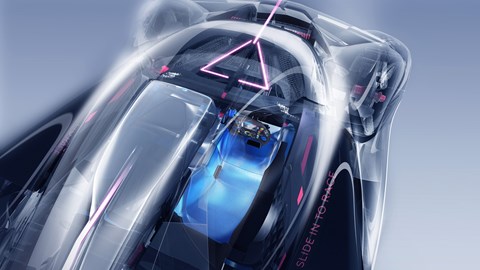► Alpenglow Hy4 ‘rolling lab’ revealed
► Fully-functioning hydrogen race car
► Hydrogen engine produces 335bhp
The Alpine Alpenglow Hy4 may sound like some kind of high-fibre alternative to Ready Brek but it might just be the saviour of motorsport as we know it. This is a ‘rolling lab’ prototype for a hydrogen-powered car that Alpine says is ‘like a reference to a future hypercar’ and hints at the brand’s future ‘stylistic evolutions’.
Presented as an alternative way of making motorsport sustainable, it uses hydrogen not in a fuel cell but to power a combustion engine – in this instance a modified four-cylinder unit, hence the ‘Hydrogen four’ retraction that makes up its name.
Alpine is just making this stuff up, isn’t it?
Well, the original Alpenglow concept car of 2022 was just that – a concept. The 2024 Alpenglow H4, however, is a fully functional test bed that will make its dynamic debut at the 6-Hours of Spa-Francorchamps endurance race on 11 May, with more demonstration runs to follow at the 2024 24-Hours of Le Mans in June.

As such, not only has the visual look of the car changed a bit, it now features a proper two-seater cockpit and a steering wheel.

More importantly, there’s also a 2.0-litre turbo engine in the back that burns hydrogen instead of petrol to produce 335bhp. This is a development of an existing engine, but later in 2024 there will be a third Alpenglow variant powered by a bespoke hydrogen V6.
Presumably this one will be the Alpenglow Hy6.
Why is Alpine doing this?
If you combust hydrogen – and this is a slight correction over the original version of this story – it doesn’t create any CO2, though it does generate heat which generates NOx (although recent hydrogen NOX research suggests there’s less of this than may have originally been thought).
This makes hydrogen engines a very low-carbon form of motivation compared with conventional ICE, but one that still delivers the sound and the fury that has thrilled motorsport fans for more than a century. Perhaps making it a more acceptable solution than the digital whine of pure electric racing.

‘As part of our active participation in decarbonising motorsports,’ says Alpine Motorsports’ vice president, Bruno Famin, ‘we see the hydrogen internal combustion engine as an extremely promising solution. We know that hydrogen will be an essential step in decarbonising the next generations of Endurance cars, and could also be for Formula 1 cars, particularly by switching to liquid storage for greater compactness and performance.’
He continues: ‘The Alpenglow prototype perfectly illustrates this, a genuine technological laboratory for developing tomorrow’s hydrogen engines.’
Are they mad?
We don’t think so – and Alpine isn’t the only brand experimenting with this approach. Toyota, for example, has been competing in various forms of motorsport with hydrogen combustion engines for a few years now.
The most notably example is a GR Corolla H2, which during a season of racing in the 2022 Super Taikyu Japanese endurance series saw significant improvements in performance and practicality – power rose 24 per cent, torque 33 per cent and range increased by 30 per cent, while refuelling time was cut from two minutes to 90 seconds.
Toyota also has its own hydrogen hypercar concept, the GR H2 Racing Concept, revealed in 2023.

Both Alpine and Toyota are responding to the Automobile Club de l’Ouest (the ACO – the organisation that runs the Le Mans 24 Hours), which has already announced that it will allow hydrogen-engined cars to compete alongside hydrogen fuel-cell vehicles in a special category in the future.
The plan to implement this has already been delayed a year – from 2026 to 2027 – so don’t expect EVs to start going out of fashion any time soon, even if the hydrogen technology in these racing cars can be made applicable to affordable road-going machines.